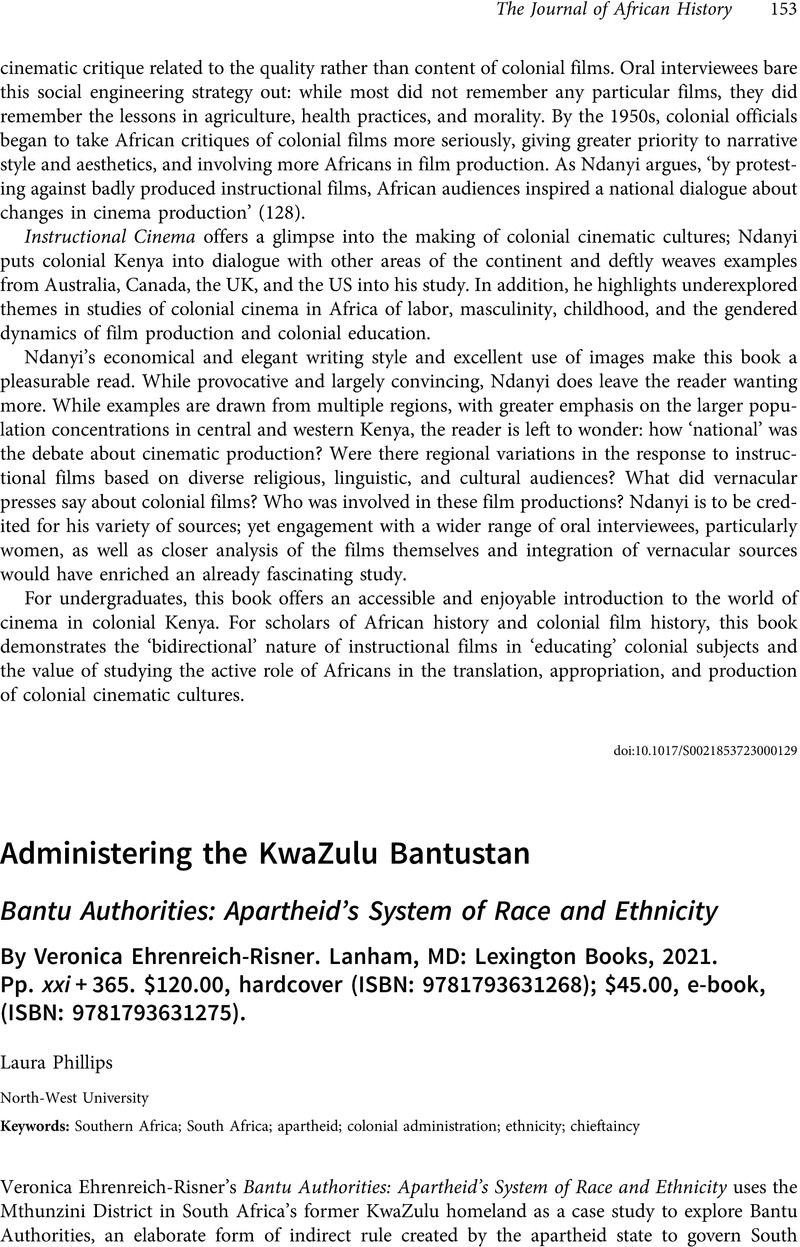No CrossRef data available.
Article contents
Administering the KwaZulu Bantustan - Bantu Authorities: Apartheid's System of Race and Ethnicity By Veronica Ehrenreich-Risner. Lanham, MD: Lexington Books, 2021. Pp. xxi + 365. $120.00, hardcover (ISBN: 9781793631268); $45.00, e-book, (ISBN: 9781793631275).
Review products
Published online by Cambridge University Press: 23 February 2023
Abstract

- Type
- Book Review
- Information
- Copyright
- Copyright © The Author(s), 2023. Published by Cambridge University Press
References
1 Wolpe, H., ‘Capitalism and cheap labour-power in South Africa: from segregation to apartheid,’ Economy and Society, 1:4 (1972), 425–56CrossRefGoogle Scholar.
2 Delius, P., ‘Sebatakgomo: migrant organization, the ANC and the Sekhukhuneland revolt’, Journal of Southern African Studies, 15:4 (1989), 581–615CrossRefGoogle Scholar; Zondi, S., ‘Peasant struggles in the 1950s: GaMatlala and Zeerust’, in South African Democracy Education Trust (ed.), The Road to democracy in South Africa, Vol. 1, 1960–1970 (Cape Town, 2004), 177–208Google Scholar; Kepe, T. and Ntsebeza, L., Rural Resistance in South Africa. The Mpondo Revolt After Fifty Years (Leiden, 2011)CrossRefGoogle Scholar.
3 See, for example, Oomen, B., Chiefs in South Africa: Law, Power & Culture in the Post-Apartheid Era (Oxford, 2005)CrossRefGoogle Scholar; Ntsebeza, L., Democracy Compromised. Chiefs and the Politics of Land in South Africa (Leiden, 2005)CrossRefGoogle Scholar; T. Thipe, ‘The boundaries of tradition: an examination of the Traditional Leadership and Governance Framework Act,’ Harvard Human Rights Journal, online symposium (2014); Buthelezi, M. and Skosana, D. (eds.), Traditional Leaders in a Democracy. Resources, Respect and Resistance. (Midrand, 2019)Google Scholar; Beinart, W., Kingwill, R., and Capps, G. (eds.), Land, Law and Chiefs in Rural South Africa: Contested histories and Current Struggles (Johannesburg, 2021)CrossRefGoogle Scholar.
4 For a helpful overview, see P. Delius, ‘Mistaking form for substance. Reflections on the key dynamics of precolonial polities and their implications for the role of chiefs in contemporary South Africa’ in Buthelezi and Skosana, Traditional Leaders in a Democracy, 24–49.
5 See for example Ally, S., ‘“If you are hungry and a man promises you mealies, will you not follow him?” South African Swazi ethnic nationalism, 1931–1986’, South African Historical Journal, 63:3 (2011), 414–30CrossRefGoogle Scholar; Kelly, J., To Swim with Crocodiles: Land, Violence, and Belonging in South Africa, 1800 – 1996, (Pietermaritzburg, 2019)Google Scholar; Parcells, A., ‘“The empire that Shaka Zulu was unable to bring about”: ethnicizing sovereignty in apartheid South Africa, 1959–1970’, Journal of Social History, 56: 1 (2022), 195–225CrossRefGoogle Scholar.





